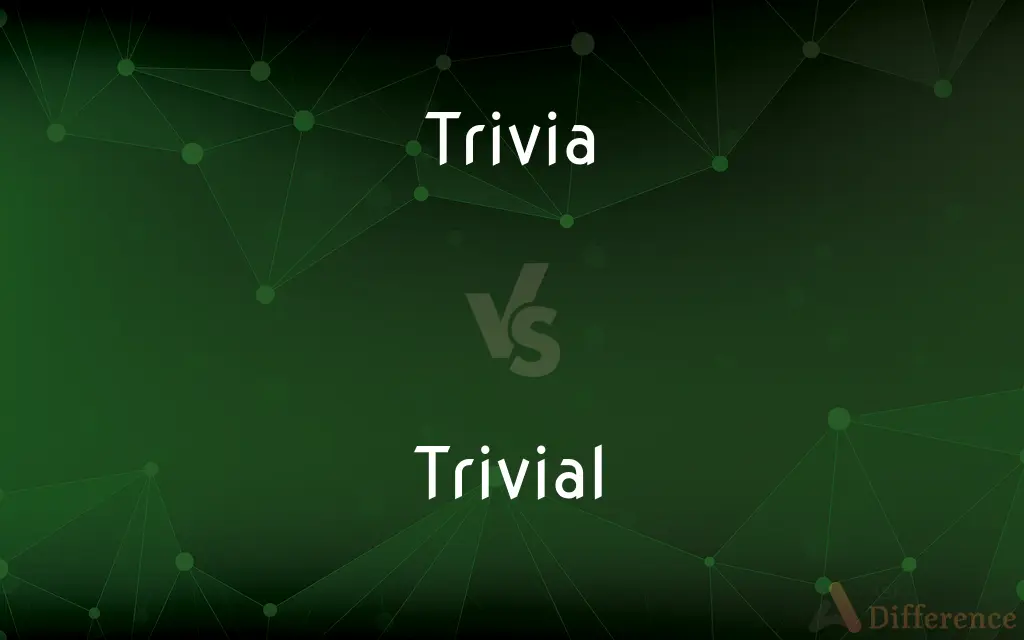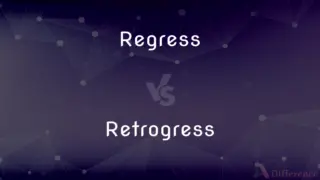Trivia vs. Trivial — What's the Difference?
By Tayyaba Rehman & Fiza Rafique — Updated on April 9, 2024
Trivia refers to facts or information of little importance, while trivial describes something of little value or importance.

Difference Between Trivia and Trivial
Table of Contents
ADVERTISEMENT
Key Differences
Trivia comprises interesting but relatively unimportant or obscure facts, often used for entertainment in games and quizzes. Trivial, as an adjective, characterizes subjects, details, or matters that are considered insignificant or of minor importance in a broader context.
While trivia often entertains and engages, offering facts that are amusing or surprising, something described as trivial may lack significance, contributing little to understanding or value in a particular discussion or situation.
The enjoyment of trivia lies in the accumulation and sharing of these small, often overlooked details, enriching cultural or personal knowledge in a light-hearted way. On the other hand, labeling something as trivial can imply that it is not worthy of serious consideration or further attention.
Despite their similar roots, the social and cultural roles of trivia and trivial diverge: trivia has carved out a niche in entertainment and social gatherings, while calling something trivial often dismisses it as unimportant.
Comparison Chart
Definition
Facts or information of little importance, often used for entertainment.
Describing something of little value or importance.
ADVERTISEMENT
Usage
Nouns – refers to specific pieces of information.
Adjective – describes the nature of something.
Context
Games, quizzes, and casual conversation.
Discussions, analyses, or critiques.
Connotation
Often positive, engaging, or entertaining.
Negative or dismissive, indicating lack of significance.
Purpose
To entertain, engage, or enrich knowledge in a light-hearted manner.
To evaluate importance, often leading to exclusion or minimal consideration.
Compare with Definitions
Trivia
Knowledge.
Trivia questions often cover obscure historical facts.
Trivial
Significance.
Critics argue that focusing on trivial matters can distract from more important issues.
Trivia
Engagement.
Trivia games are popular at parties for their engaging nature.
Trivial
Attention.
During meetings, it's best to avoid trivial details to save time.
Trivia
Learning.
Despite being considered of little importance, trivia can enhance knowledge on a wide range of topics.
Trivial
Perception.
What may seem trivial to one person can be of interest to another, highlighting subjective value.
Trivia
Entertainment.
Many apps are designed around answering trivia for entertainment.
Trivial
Assessment.
The trivial aspects of the report were ignored in favor of more impactful findings.
Trivia
Social Interaction.
Trivia nights foster social interaction and competition.
Trivial
Prioritization.
Effective management involves distinguishing trivial tasks from critical ones.
Trivia
Trivia is information and data that are considered to be of little value. It can be contrasted with general knowledge and common sense.
Trivial
Of little significance or value.
Trivia
Plural of trivium.
Trivial
Concerned with or involving unimportant matters; superficial
A trivial colleague.
A trivial remark.
Trivia
The lower division of the seven liberal arts in medieval schools, consisting of grammar, logic, and rhetoric.
Trivial
Of, relating to, or being the solution of an equation in which every variable is equal to zero.
Trivia
Insignificant trifles of little importance, especially items of unimportant information.
These trivia take up too much of the day.
This trivia takes up too much of the day.
Trivial
Of, relating to, or being the simplest possible case; self-evident.
Trivia
A quiz game that involves obscure facts.
I joined the trivia club this semester!
Trivial
Ignorable; of little significance or value.
Trivia
Something of small importance
Trivial
Commonplace, ordinary.
Trivial
Concerned with or involving trivia.
Trivial
(taxonomy) Relating to or designating the name of a species; specific as opposed to generic.
Trivial
(mathematics) Of, relating to, or being the simplest possible case.
Trivial
(mathematics) Self-evident.
Trivial
Pertaining to the trivium.
Trivial
(philosophy) Indistinguishable in case of truth or falsity.
Trivial
(obsolete) Any of the three liberal arts forming the trivium.
Trivial
Found anywhere; common.
Trivial
Ordinary; commonplace; trifling; vulgar.
As a scholar, meantime, he was trivial, and incapable of labor.
Trivial
Of little worth or importance; inconsiderable; trifling; petty; paltry; as, a trivial subject or affair.
The trivial round, the common task.
Trivial
Of or pertaining to the trivium.
Trivial
One of the three liberal arts forming the trivium.
Trivial
(informal terms) small and of little importance;
A fiddling sum of money
A footling gesture
Our worries are lilliputian compared with those of countries that are at war
A little (or small) matter
Mickey Mouse regulations
A dispute over niggling details
Limited to petty enterprises
Piffling efforts
Giving a police officer a free meal may be against the law, but it seems to be a picayune infraction
Trivial
Obvious and dull;
Trivial conversation
Commonplace prose
Trivial
Of little substance or significance;
A few superficial editorial changes
Only trivial objections
Trivial
Concerned with trivialities;
A trivial young woman
A trivial mind
Trivial
Not large enough to consider or notice
Common Curiosities
What is the difference between trivia and trivial?
Trivia refers to bits of interesting but non-essential information, while trivial describes something as having little importance or value.
Why do people enjoy trivia?
People enjoy trivia for its entertainment value, ability to engage groups in social settings, and the joy of learning obscure facts.
Can focusing on trivial matters be beneficial?
While generally seen as unimportant, focusing on trivial matters can sometimes uncover overlooked details or provide a break from more serious considerations.
Can trivia be trivial?
Yes, trivia can be considered trivial in that it often consists of facts that don't significantly impact broader knowledge or affairs.
What makes a fact or detail trivial?
A fact or detail is considered trivial if it is seen as having little to no impact on the understanding or outcome of a situation or subject.
How can I tell if something is trivial?
Something is trivial if it does not significantly affect the broader context or outcome of a discussion, decision, or area of study.
How do trivia games make learning fun?
Trivia games turn learning into a competitive and engaging activity, making the acquisition of knowledge enjoyable.
What is an example of a trivial concern?
Concerning oneself with the specific type of paper used in a report could be considered a trivial concern if it does not affect the report's content or readability.
How do trivia and trivial relate to each other in language?
Both words stem from the Latin for "crossroads" or "three roads," metaphorically referring to common or superficial knowledge; however, their usage in English has diverged to reflect distinct meanings.
How is trivia used in education?
Trivia can be used in education as a fun way to introduce new topics, engage students, and encourage the retention of information through gamification.
Can the perception of what is trivial change over time?
Yes, what is considered trivial can change with new contexts, understandings, or cultural shifts, highlighting the fluidity of significance.
Why might trivia be important in social settings?
In social settings, trivia can break the ice, foster competition, and provide a fun way for people to connect over shared knowledge or interests.
Is it negative to describe something as trivial?
Describing something as trivial often carries a negative connotation, implying that it lacks significance or value in a given context.
Is there a place for trivial information in professional settings?
While generally minimized, trivial information can sometimes serve as a conversation starter or lighten the mood in professional settings.
What role does trivia play in digital and media culture?
Trivia plays a significant role in digital and media culture by providing content for games, shows, and apps designed to entertain and educate simultaneously.
Share Your Discovery

Previous Comparison
Regress vs. Retrogress
Next Comparison
Tunnel vs. CulvertAuthor Spotlight
Written by
Tayyaba RehmanTayyaba Rehman is a distinguished writer, currently serving as a primary contributor to askdifference.com. As a researcher in semantics and etymology, Tayyaba's passion for the complexity of languages and their distinctions has found a perfect home on the platform. Tayyaba delves into the intricacies of language, distinguishing between commonly confused words and phrases, thereby providing clarity for readers worldwide.
Co-written by
Fiza RafiqueFiza Rafique is a skilled content writer at AskDifference.com, where she meticulously refines and enhances written pieces. Drawing from her vast editorial expertise, Fiza ensures clarity, accuracy, and precision in every article. Passionate about language, she continually seeks to elevate the quality of content for readers worldwide.















































